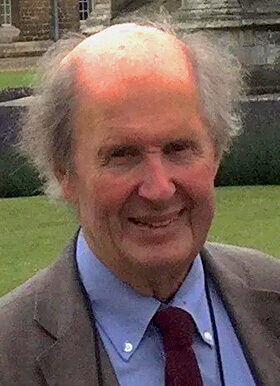2023 Serpins - Keynotes

Robin Carrell, PhD
Emeritus Professor of Haematology
Trinity College, University of Cambridge
Cambridge, England
Dr. Robin Carrell is a medical researcher from New Zealand whose studies, defined and named the serpins, a family of proteins that control key functions in life. With colleagues, he elucidated the structure of more than 20 serpins and demonstrated how their ability to change their shape modifies their function. He showed how this enables serpins to modulate cellular functions, most notably in the blood, including control of coagulation, carriage of hormones and regulation of blood pressure. He also demonstrated how mutations in serpins that affect their ability to change shape predispose humans to a range of diseases, including emphysema, thrombosis, and hypertension. The demonstration that the same mutations in a brain-specific serpin caused neurodegeneration has opened new insights into the molecular pathology of the late-onset dementias. Robin’s earlier work in Christchurch, New Zealand, on the stabilization of the haemoglobin molecule led to the cofounding in 1985 of biotechnology company Canterbury Scientific. A year later, he won the Hector Medal of the Royal Society of New Zealand, having been elected a Fellow (FRSNZ) in 1980.

James A. Huntington, PhD
Professor of Molecular Haemostasis
Cambridge Institute for Medical Research
Cambridge, England
Jim Huntington, Professor of Molecular Haemostasis at the University of Cambridge, is internationally recognized for elucidating the basic structural mechanisms of proteins that control blood coagulation and for applying this knowledge to develop potential therapeutics. His group have solved crystal structures of serpin polymers, revealing the mechanism of misfolding that can lead to thrombosis, emphysema, cirrhosis and dementia, and suggesting how ‘chemical chaperones’ might rescue folding. Professor Huntington’s group has also made significant discoveries on proteins and protein complexes that regulate the formation of blood clots, including prothrombinase and thrombin.

James Whisstock, PhD
Deputy Dean Research
Faculty of Medicine Nursing and Health Sciences
Monash University
Professor James Whisstock studied for his degree and PhD at Cambridge University. He moved to Monash in 1997. Currently, James is an NHMRC Senior Principal Research Fellow and Director of the ARC Centre of Excellence in Advanced Molecular Imaging.His research interests include structural biology and drug development around immune-related complexes; these include proteases and protease inhibitors and pore forming proteins such as perforin. From a molecular perceptive his focus includes understanding embryonic patterning in Drosophila and how the perforin-like protein Torsolike controls activation of the receptor tyrosine kinase Torso.